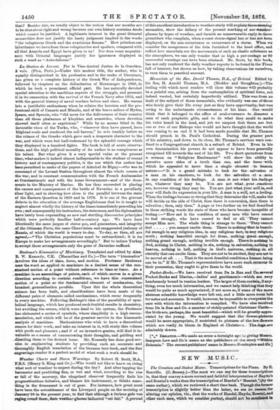La Station du Levant. Par le Vice-Amiral Jurien de la
Graviere. 2 vols. (Plon, Paris.)—Under this modest title, the author, who is equally distinguished in his profession and in the ranks of literature, has given us a complete history of the Greek War of Independence, followed by chapters on the delimitation of Montenegro in 1858, in which he took a prominent official part. He has naturally devoted special attention to the maritime aspects of the struggle, and presents it in its connection with the revival of the French Navy after 1815, and with the-general history of naval warfare before and since. He warms into a justifiable enthusiasm when he relates the heroism and the pro- fessional skill of Canaria and Miaulis, and of the brave sailors of Hydra, Ipsara, and Spezzia, who "did more for the deliverance of their country than all those phalanxes of klephtes and armatoles, whose devotion showed itself often so capricious." While by no means blind to the incurable -vices of the Turks, who, "wherever they have passed, have blighted souls and rendered the soil barren," he sets frankly before us the crimes of the Greeks which gave such a desperate character to the war, and which were but half-redeemed by the splendid courage which they displayed in a hundred fights. The book is full of acute observa- tions, and the high political morality of its author is as conspicuous as his talent. But what gives it a very special value at the present time, whatmakes it indeed almost indispensable to the student of recent history and of contemporary politics, is the use which the author has been permitted to make of the papers of Admiral de Itigny—who was in command of the Levant Station throughout almost the whole course of the war, and in constant communication with the French Ambassador at Constantinople and with the home Government—and of the docu- ments in the 'Ministry of Marine. He has thus succeeded in placing the causes and consequences of the battle of Navarino in a peculiarly, clear light, and in showing how close is the parallel between the state of the Eastern Question in 1828 and in 1876. It is one of the gravest defects in tho education of the average Englishman that he is taught to neglect almost wholly the history of the times immediately preceding his own ; and consequently his instructors, his statesmen, and his diplomatists have lately been expounding as new and startling discoveries principles which were perfectly familiar half-a-century ago. We have here Identically the same jargon of status quo, and guarantees, and integrity of the Ottoman Porte, the same Chauvinism and exaggerated jealousy of Rumaia, of which the world is weary to-day. To-day, as then, all are agreed,—" The Christian populations must be enfranchised; it is for Europe to make her arrangements accordingly." But to induce Turkey toaccept those arrangements only the guns of _Navarino aufficed.






































 Previous page
Previous page